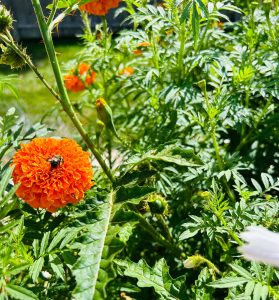October 2024 Master Gardener Volunteer Newsletter
In this issue…
- From the President…
- Therapeutic Gardening (Part 1 of 3)
- Roots: Meet an MGV
- Volunteer Opportunity Spotlight
- What’s Happening in My Garden
- Upcoming Events
From the President…
“Life starts over again when it gets crisp in the Fall.” – F. Scott Fitzgerald
The trickle of falling leaves in September has turned our landscape into a wonderland of fall colors. Our foliage is fleeting so I encourage you to get out and enjoy the incredible array in Cumberland County and maybe do some apple picking as well.
While the height of the growing season is only a memory now (despite our best efforts to extend it) we’re reaching the end of the natural active growing season. A Jesuit colleague always said, “the end of one growing season signifies the beginning of the next”. He relished the autumnal quiet of “buttoning up his garden” in the midst of the beginning of a new school year. From preserving, freezing, saucing, and drying of this year’s harvest to soil preparation, winterizing, bulb planting, and general tool and garden clean-up, there’s certainly plenty to still do outside during these beautiful tranquil fall days.
Each year, I keep a list of my gardening successes and failures. While this year’s success list has been greatly helped by Mother Nature, there are still mistakes to be hopefully corrected next year. No matter how big or small, successful, or challenged your gardens were this year, remember there is always next year. And – before we know it – the 2025 seed catalogs will be arriving in our mailboxes!
I’d encourage all to take in the incredible displays of handiwork and produce at the Cumberland, Common Ground, and Fryeburg agricultural fairs. I’m continually amazed and inspired by the talents of the contributors to these great events. And let’s not forget the myriad of food offerings! Where else can we access a complete turkey dinner, fried dough, cotton candy, apple crisp, a plateful of blooming onions and pizza in a single outing?!
The CCMGA Board did not meet in September so I have very little news to share. A Board sub-committee has done some initial work on our Association’s restructuring. Our next Board Meeting will be in October. Please mark your calendars for the Annual Harvest Celebration that is scheduled for Saturday, October 5th, 2024, from 3-6 PM at Tidewater in Falmouth.
Enjoy the end of our growing season. May it yield us not only a beautiful and bountiful harvest, but as importantly, tranquility.
Gary Hoyt
The Science of Therapeutic Gardening (Part 1 of 3)
Guest columnist MGV Colleen Griffin is a Registered Horticultural Therapist currently practicing in Southern Maine and co-owner of a therapeutic horticultural practice, Cultivating Well-Being, LLC. Her recent work has been focused on community wellness and climate anxiety. Her research, for program development, has led her to the conclusion that spending time in a garden space, as well as becoming involved in community horticultural programs, helps to mitigate our collective anxiety regarding climate change and other stressors in life. We’re lucky to have Colleen contributing a series of three articles to our monthly newsletter!
Being one of eleven Registered Horticultural Therapists practicing within the State of Maine, I frequently encounter those who are unfamiliar with horticultural therapy. Often, I need to explain what my profession involves. A quick response is usually, “It is the practice of using plants and gardening activities as therapeutic tools,” which always leaves me feeling a bit flat, as though I have shortchanged what my profession embodies. I struggle to sufficiently, yet briefly, define what horticultural therapy is and more importantly, the benefits of this healing practice. Ultimately, I find that the best explanation lies within the people-plant relationship.
What is the People-Plant Relationship?
This symbiotic relationship is foundational to the practice of horticultural therapy. It is common knowledge that humans exist because plants provide the essential tools for our survival right down to the air we breathe. Therefore, it makes sense that when humans are looking to improve quality of life, recover from illness or injury or simply escape from the stress of daily routines, we turn toward nature. But in this age of technology, many disregard this valuable and healing connection. Far too often, we see harmful side effects from interventions that strive to promote health but fail because this primordial relationship is not utilized or even recognized by modern day medicine.
To understand the relevance of the people-plant relationship, one must look at the human response to our natural environments from a physiological perspective. The following three research studies make clear the physiological as well as the psychological benefits of this vital alliance.
“Place can make you sick… and place can make you well”.
Dr. Esther Sternberg, M.D. is a Professor of Medicine and Founding Research Director for the Arizona Center for Integrative Medicine at the University of Arizona. She is the author of Healing Spaces: The Science of Place and Well-Being. Dr. Sternberg believes there is a complicated yet intimate relationship between our five senses, our emotions, and our immune system. Simply put, when we stimulate our sense of smell, touch, taste, sight, and hearing in a positive manner our emotional state is elevated. When our emotional state is elevated our stress level lowers. By maintaining a lower stress level, our immune system is less burdened. It is obvious to any gardener that spending time surrounded by plants will stimulate all five senses in a positive manner, lower your stress level, and therefore will bolster your immune system. Dr. Sternberg maintains that our environment is of critical importance to our overall health and wellness. She goes on to declare that “the science of place and well-being is today, the cutting edge of medicine”.
Attention Restoration Theory
ART was developed by Stephen and Rachel Kaplan, Environmental Psychology professors at University of Michigan. They claim that humans are capable of only two types of attention – directed and involuntary. Directed attention requires concentration and causes mental fatigue. It is part of your fight or flight response. You use directed attention while learning a new skill, multi-tasking or conversing with others. Involuntary attention does not require effort and is restorative. It is part of your rest and reflect response. You use involuntary attention to recover from the fatigue produced by directed attention. Involuntary attention occurs readily in a natural environment. Think of attending a conference, being enclosed in a dark room, staring at a bright screen with flashing images. Your brain is overloaded with new information. During your lunch break you step outside. It is a warm, sunny day, the scent of fresh flowers is in the air, birds are singing…. your attention instinctively switches from directed to involuntary. Your stress level drops, you breathe deeper, and your mind clears.
An inherent benefit of involuntary attention is the production of T-lymphocytes, aka natural killer cells. T-lymphocytes are white blood cells produced in the thymus gland that fight inflammation throughout the body and are an integral part of your immune response. This coincides with what Dr. Sternberg claims that being in the presence of nature is beneficial to our immune system.
View Through a Window May Influence Recovery from Surgery
This hallmark study conducted by Roger Ulrich, Ph.D., further supports the validity of the people-plant relationship. Ulrich’s study uses surgical records of cholecystectomy patients in a suburban Pennsylvania hospital over a nine-year period. Twenty-three patients were assigned to a room that overlooked a natural environment with trees and active wildlife. An additional twenty-three patients were assigned to a room on the other side of the post-operative ward that had a view of a featureless brick wall. The patients with a natural view required less pain medication, had a shorter hospital stay, and generally reported a more positive post-operative experience than their counterparts on the other side of the ward. The evidence was clear, being in the presence of nature helps to speed recovery. This study led, in part, to the creation of biophilic design in many hospitals and recovery facilities across the globe.
Since the publication of Ulrich’s research in 1984, it has been recreated countless times from North America to Asia and from Northern Europe to Australia, always achieving the same conclusion. A most compelling fact, one which cannot be ignored, is this body of research does not consider the socio-economic status, cultural differences, or gender preference of the research subjects, yet the results do not waver. It is acutely obvious, we are all more alike than different and profoundly connected to our natural environment.
Having a deeper understanding of the people-plant relationship will enrich the experience of spending time in the garden. MGV’s should be aware of the indisputable benefits of this vital relationship. Awareness comes about by focusing on physiological change during a sensory experience, like working in the garden. Being in the presence of plants and nature leads to the stimulation of your five senses, involuntary attention takes over, your blood pressure drops, you breathe deeper and slower, and you experience clarity of mind. These changes contribute to a happier emotional state due to a drop in your stress level which in turn bolsters your immune system.
In my experience, the people-plant relationship is largely misunderstood and at times forgotten all together. But most any Master Gardener will tell you that time spent in the garden is time not wasted. In fact, gardening will enrich your life far beyond producing fresh vegetables for the dinner table.
Roots – Get to Know an MGV
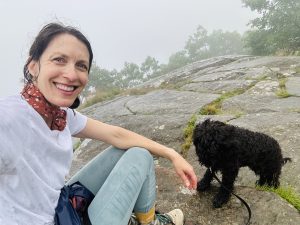
MGV Intern (and newsletter coordinator!) Heather Wiggins Berger is happy to be back in New England after more than a decade away pursuing jobs and master’s degrees across the Mid-Atlantic, Midwest, and Pacific Northwest. Born and raised in Massachusetts, Heather, her husband Dan, and two young boys, Jonathan (9) and Charles (8) now call Yarmouth home. They purchased their home in August 2020 having seen it only via a Facetime call from Seattle. Unsurprisingly, the house has needed more work than anticipated… but the blood, sweat, and tears are paying off and the plant-filled sunroom is now everyone’s favorite hangout spot.
The yard has also provided a blank slate for all types of outdoors projects and making memories as a family. Heather recalls spending hours in the garden with her parents as a child, planting the tomato and pepper starts they’d raised under grow lights in the warm furnace room and trying milk-fed pumpkins like Laura Ingalls Wilder chronicled in her books. “It’s been meaningful to start bringing these memories to life with my own children. We installed 4 large raised beds last summer and have had fun with vegetable experimentation. Jonathan and Charles each got their own little plot to do whatever they want with. This year our lunchbox peppers and slicing cucumbers have been huge hits. We’ve enjoyed the unexpected combinations the most, like geraniums next to ghost pumpkins and butternut squash in the herb garden. The volunteers have been keeping us on our toes. It’s fun to mix things up!”
With a home right on Main Street in Yarmouth Village, Heather’s been focused this year on beautifying the parking strip with native pollinator plants and removing overgrown trees and shrubs from around the home. New plants are going in this week – and a few large boulders and Little Free Library are getting installed as well to add natural textural interest and invite community engagement. “My MGV lessons and conversations with fellow gardeners have helped me embrace the messiness (read: failures) of gardening” and have given me confidence to try new things without fear.”
When not in the yard or driving kids to soccer and hockey practices, you’ll find Heather out running trails as she trains for an upcoming 50k in Cutler. She also works full time at Disney in creative strategy and project management and has a side hustle as a professional home organizer. Finally, Heather and her husband also co-manage a rental cottage adjacent to their home.
Is there a Master Gardener Volunteer you’d like to see featured here? Nominate them by emailing Heather Wiggins Berger.
Volunteer Opportunity Spotlight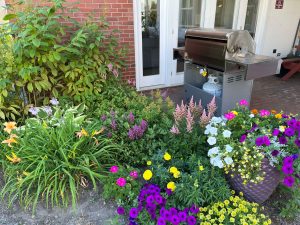
Several years ago, Master Gardener Volunteers Robin Babino and Nicki Griffin teamed up to work on the Ronald McDonald House Gardens after several non-master gardener volunteers had made a few “mistakes” in taking care of the gardens – as they say, too many cooks spoil the broth!! Over the years, several other Master Gardener Volunteers have joined and it became a registered Master Gardener project around 2019. The current crew, Robin Babino, Nicki Griffin, Delores Tesla, Pam Nickless, Jen Peavey, and Emma Rogge, meet each spring and fall to plan what improvements can be made and work out a schedule to maintain the gardens.
Robin connected several years ago with Gary Howard, owner of Urban Garden Center, who provided a great deal of financial support as well as plants and other materials that were used to create the wonderful container gardens. In 2020, Ronald McDonald House awarded their Heart of Gold award to the MGV project crew along with Urban Garden Center.
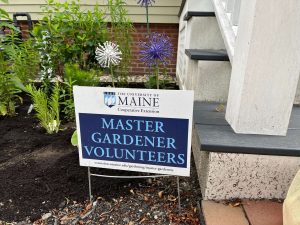 Urban Garden Center does continue to provide some materials since they closed their Topsham location. However with the closure of the Urban Garden Center, the project needed to find another source for plants. The project asked for financial support from the Master Gardener Seed Grant program and has received two generous grants. With these grants, the Ronald Mcdonald House Garden project was able to add a native plant garden and replace a dogwood in 2023. In 2024, the Seed Grant program helped purchase the annuals for the many colorful and vibrant container gardens, as well as rehabilitating a problem area with new spirea and catmint.
Urban Garden Center does continue to provide some materials since they closed their Topsham location. However with the closure of the Urban Garden Center, the project needed to find another source for plants. The project asked for financial support from the Master Gardener Seed Grant program and has received two generous grants. With these grants, the Ronald Mcdonald House Garden project was able to add a native plant garden and replace a dogwood in 2023. In 2024, the Seed Grant program helped purchase the annuals for the many colorful and vibrant container gardens, as well as rehabilitating a problem area with new spirea and catmint.
The MGV’s have worked hard to create a colorful and serene place for the families staying at the Ronald McDonald House to be able to relax and enjoy the gardens. There is seating for anyone stopping by and the view from the inside looking out is always lovely. Robin is a master at putting together gorgeous containers!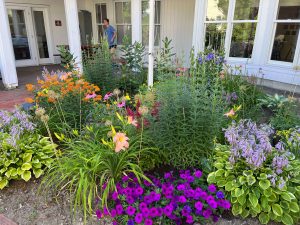
Every time the MGV crew works in the gardens watering, weeding, and deadheading, during the weekly schedule, they have received such great thank yous from the families staying at the house, the volunteers who work a shift there, and from neighbors who walk by. It’s truly a labor of love!
We’re looking for volunteer projects to feature in our Master Gardener Volunteer Newsletter. If you are interested in having your project featured – or if there is a project you would like to learn more about – please reach out to Kerri Frazier.
What’s Happening in my Garden
“It’s been a successful year in my vegetable garden. Most of my winter starts took off as soon as they went into the ground in late May and we’ve been feasting on lettuce, radishes, tomatoes, squash, and more all summer. However, the biggest late summer surprise was the volunteers. Giant marigolds and litchi tomatoes (an experiment from last summer) popped up in late July, have taken off over the last couple of months, and continue to draw large quantities of pollinators to the garden. I’m loving the colors and textures newly emerging in my garden so late in the growing season.” – Heather Wiggins Berger
Want to share what’s going on in your garden? Please reach out to Kerri Frazier. Both successes and maybe not so successful moments are totally welcome.
MGV Events
Field Day at Tidewater Farm – Saturday, October 19, 10:00 a.m. to 12:00 p.m.
Join UMaine Extension staff and Master Gardener Volunteers for a family-friendly morning in the Gardens at Tidewater Farm! Come experience the gardens, learn about Extension’s work, ask gardening questions and participate in hands-on demonstrations beginning at 10:30 AM. No registration required.
Hands-on demonstrations will focus on best practices for wrapping up the season while simultaneously getting a jump start on next season through planning and soil testing. Participants will also take home native seeds to sow outdoors this fall or winter.
Cumberland County MGV Speaker Series
The Speaker Series and Special Projects committees recently joined to become the Education Committee with Barbara Dee and Jim Casey as Co-Chairs. We have an exciting schedule planned although we have a few gaps so if you have any ideas on topics or presenters please let Barbara or Jim know. Here’s the schedule so far – all events are offered on a sliding fee.
- Thursday, October 10: Enter the Garden of Silence – From Seeing to Writing with Deb McKew | 4:30 PM – 6:00 PM | Falmouth
- Monday, October 28: Harvesting and Saving Native Seeds with Pamela and Extension staff | 4:00 PM – 5:30 PM | Falmouth
- Thursday, December 12: TBD
- Thursday, January 9: Growing Figs in Maine with Bob McArdle | 5:00 PM – 6:30 PM | Zoom
- Thursday, February 13: Drought Resistant Gardens with Amy Witt | 5:00 PM – 6:30 PM | Zoom
- Thursday, March 13: Therapeutic Horticulture | 5:00 PM – 6:30 PM | Zoom
- Thursday, April 10: Biochar and Soils with Andrew Carpenter of Northern Tilth | 5:00 PM – 6:30 PM | Zoom
- Thursday, May 8: Insects: Maine’s Oddballs, Tricksters & Lookalikes | 5:00 PM – 6:30 PM | Zoom
- Thursday, June 12: TBD
University of Maine Extension Events
- Saturday, October 5: Preserving Cranberry Habanero Jelly | 9:00-12:00 PM | Bangor | $20
- Monday, October 7: Preserving Fruit and Hot Pepper Jams | 5:30-8:30 PM | South Portland | $45-$55
- Tuesday, October 8: Fundamentals of Home Canning | 6:00-9:00 PM | Brunswick | $70
- Tuesday, October 8: Intro to Boiling Water Bath Canning | 6:00-9:00 PM | Skowhegan | $5
- Thursday, October 17: Intro to Pickling | 6:00-8:00 PM | Old Orchard Beach | $49
- Thursday, October 24: Preserving Apples and More | 5:30-8:00 PM | Windham | $39
- Wednesday, October 30: Preserving Apples | 5:30-8:00 PM | South Portland | $45-$55
Community Events
- Sunday, October 6: Fall Plant Walk at Gisland | 10:00-12:00 PM | Falmouth | Free
- Wednesday, October 9: Bringing Nature Home: Collecting Seeds From Native Plants | 6:30-7:30 PM | Online | Free
- Thursday, October 10: Yardscaping: From Lawns to Landscapes | 6:00-8:00 PM | Buxton | $10
- Thursday, October 17: Garden Clean-up Webinar | 6:00-7:30 PM | Online | Free-$25
- Saturday, October 19: Fermentation: Kimchi, Kraut, and Takuan | 10:00-1:00 PM | South Portland | $50-$80
- Saturday, October 19: Bringing Nature Home: Seed Collection Field Experience | 10:00-12:00 PM | Holden | $15
- Wednesday, October 23: Bringing Nature Home: Winter Garden Prep – The New Fall Checklist | 6:30-7:30 PM | Online | Free
- Thursday, October 24: Seed Sowing Workshop | 4:00-6:00 PM | Portland | Free
- Thursday, October 31: Four Season Fall Walk at Woodward Point | 3:00-4:30 PM | Free
Past Editions: Missed a previous newsletter? View them all HERE (password: ladybug)
About this Newsletter: The Cumberland County Master Gardener Volunteer Newsletter is edited by Clarissa Brown, Kerri Frazier, and Heather Wiggins Berger. If you would like to submit an event, article,or help with any aspect of the Newsletter, please contact Heather Wiggins Berger, the newsletter coordinator.

